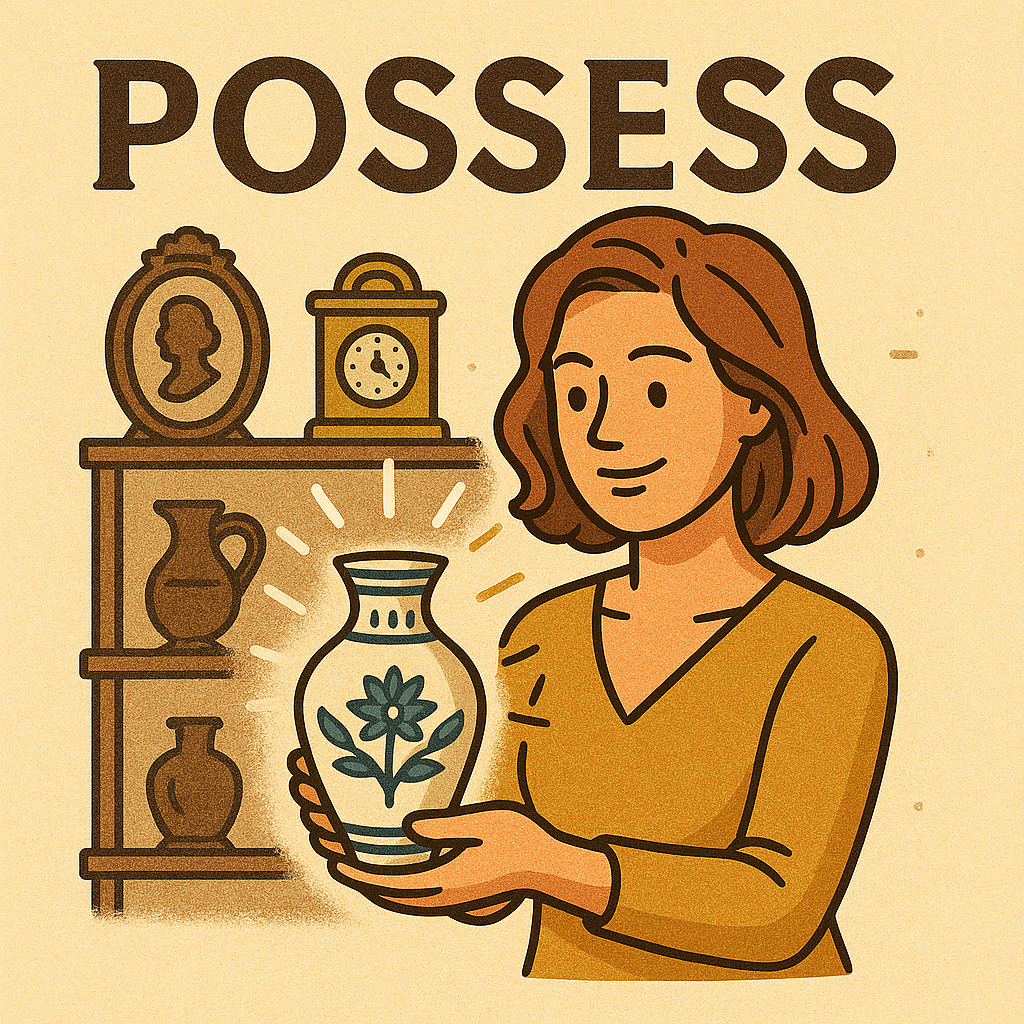Possess
Definition
The term "possess" means to own, have control over, or hold something as property, quality, or a characteristic.
Parts of Speech
- Verb
Pronunciation
American English
- IPA Pronunciation: /pəˈzɛs/
- Respelling: puh-ZESS
British English
- IPA Pronunciation: /pəˈzɛs/
- Respelling: puh-ZESS
Etymology
The word "possess" comes from the Latin "possessio," derived from "possidere," which combines "potis" (able, powerful) and "sedere" (to sit). It entered Middle English via Old French "possesser," meaning "to own or control."
Derivatives
- Possession (noun)
- Possessor (noun)
- Possessive (adjective)
- Possessively (adverb)
- Possessiveness (noun)
Synonyms
- Own
- Hold
- Control
Antonyms
- Lose
- Lack
- Surrender
Usage
The verb "possess" is used to describe ownership, qualities, or control. For example: "He possesses great talent," or "The company possesses a large estate."
Related Terms
- Ownership: The state of possessing something.
- Control: The power to influence or direct behavior or events.
- Property: Something owned or possessed.
Detailed Definitions
Verb
- To own or have as property: Refers to holding legal ownership of an object or asset.
- Example: "She possesses a beautiful antique collection."
- To have as a quality or characteristic: Refers to holding an inherent or acquired trait.
- Example: "He possesses great courage."
- To control or dominate (figuratively): Refers to something taking over someone's mind or actions.
- Example: "A sudden fear possessed her."
possess



🇨🇳 Mandarin
- 拥有 (to own)
- IPA Pronunciation: /jʊŋ˧˥jou̯˥˥/
- English Respell: yong-you
- 具有 (to be filled with a feeling or quality)
- IPA Pronunciation: /t͡ɕy˥˩jou̯˥˥/
- English Respell: ju-you
🇮🇳 Hindi
- स्वामित्व रखना (to own)
- IPA Pronunciation: /svaːmitv rəkhnaː/
- English Respell: swamitv rakhna
- आभास (to be filled with a feeling or quality)
- IPA Pronunciation: /aːbhaːs/
- English Respell: abhaas
🇪🇸 Spanish
- Poseer (to own)
- IPA Pronunciation: /poseˈeɾ/
- English Respell: po-se-er
- Tener (to be filled with a feeling or quality)
- IPA Pronunciation: /ˈteneɾ/
- English Respell: te-ner
🇫🇷 French
- Posséder (to own)
- IPA Pronunciation: /pɔ.se.de/
- English Respell: po-se-de
- Avoir (to be filled with a feeling or quality)
- IPA Pronunciation: /a.vwaʁ/
- English Respell: a-vwar
🇦🇪 Arabic (Modern Standard)
- يملك (to own)
- IPA Pronunciation: /jamlik/
- English Respell: yamlik
- يتوافر (to be filled with a feeling or quality)
- IPA Pronunciation: /jatawaffar/
- English Respell: yatawaffar
🇧🇩 Bengali
- অধিকার (to own)
- IPA Pronunciation: /ɔdhikar/
- English Respell: odhikar
- অভিপ্রেত (to be filled with a feeling or quality)
- IPA Pronunciation: /ɔbhipret/
- English Respell: obhipret
🇷🇺 Russian
- Обладать (to own)
- IPA Pronunciation: /ɐblɐˈdatʲ/
- English Respell: ob-la-dat
- Иметь (to be filled with a feeling or quality)
- IPA Pronunciation: /ɪˈmʲetʲ/
- English Respell: i-myet
🇵🇹 Portuguese
- Possuir (to own)
- IPA Pronunciation: /pozuˈiɾ/
- English Respell: po-zu-ir
- Ter (to be filled with a feeling or quality)
- IPA Pronunciation: /teɾ/
- English Respell: ter
🇮🇩 Indonesian
- Memiliki (to own)
- IPA Pronunciation: /məmiˈliki/
- English Respell: me-mi-li-ki
- Mempunyai (to be filled with a feeling or quality)
- IPA Pronunciation: /məmpuˈɲai/
- English Respell: mem-pu-nyai
🇩🇪 German
- Besitzen (to own)
- IPA Pronunciation: /bəˈzɪt͡sn̩/
- English Respell: be-zit-sen
- Haben (to be filled with a feeling or quality)
- IPA Pronunciation: /ˈhaːbn̩/
- English Respell: ha-ben
🇯🇵 Japanese
- 所有する (to own)
- IPA Pronunciation: /ɕoːjɯː suɾu/
- English Respell: shoyuu suru
- 有する (to be filled with a feeling or quality)
- IPA Pronunciation: /jɯː suɾu/
- English Respell: yuu suru
🇻🇳 Vietnamese
- Sở hữu (to own)
- IPA Pronunciation: /ʂo˧ˀ˨ʔ hɨw˧˧/
- English Respell: so huu
- Có (to be filled with a feeling or quality)
- IPA Pronunciation: /kɔ˧ˀ˦/
- English Respell: co
🇰🇷 Korean
- 소유하다 (to own)
- IPA Pronunciation: /sojuhada/
- English Respell: so-yu-ha-da
- 가지고 있다 (to be filled with a feeling or quality)
- IPA Pronunciation: /kɐd͡ʑiɡo it̚da/
- English Respell: ga-ji-go it-da
🇹🇷 Turkish
- Sahip olmak (to own)
- IPA Pronunciation: /sɑhip olmɑk/
- English Respell: sahip olmak
- Dolu olmak (to be filled with a feeling or quality)
- IPA Pronunciation: /dolu olmɑk/
- English Respell: dolu olmak
Possess"
Possess is a verb used to denote the act of having as belonging to one, or being in control of.
Pronunciation
- American English: /pəˈzɛs/ (puh-zess)
- British English: /pɒˈzɛs/ (po-zess)
Etymology
"Possess" originates from the Middle English word "possesen", which comes from the Old French "possesser", derived from Latin "possidere" which means "to occupy, hold, possess". It was first used in the 14th century.
Parts of Speech
"Possess" is typically used as a verb.
Derivatives
- Possessor
- Possessive
- Possession
- Dispossess
- Prepossess
Synonyms
- Own
- Hold
- Command
Antonyms
- Dispossess
- Relinquish
- Surrender
Usage
"Possess" is used to denote the state of owning or having something as belonging to one, or being in control of it. It is often used in contexts involving ownership of physical items, but can also refer to abstract concepts, like qualities, characteristics, or emotions.
Related Terms
Ownership, Possession, Property, Control, Command
Detailed Definition
"Possess" is primarily used as a verb, and it carries the following meanings:
- To have as belonging to one; to own: "I possess a small collection of antique coins."
- To have as a quality, characteristic, or other attribute: "He possesses a great deal of patience."
- To have knowledge or mastery of: "She possesses a thorough understanding of the subject."
- To gain or exert influence or control over; dominate: "Obsessive thoughts possessed him."
- In relation to demons or spirits, to enter into and control: "In the movie, a malevolent spirit possesses the doll."
🇵🇰 Urdu
- ملکیت (to own)
- IPA Pronunciation: /mulkiːt/
- English Respell: mulkiyat
- کسی جذبے سے بھرپور ہونا (to be filled with a feeling or quality)
- IPA Pronunciation: /kisi jazbe se bharpoor hona/
- English Respell: kisi jazbe se bharpoor hona





